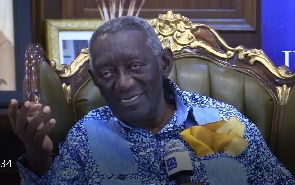Ghana’s oldest former president, John Agyekum Kufuor, has suggested that the tenure of office for a president or an elected government should be relooked at.
According to him, the current four-year tenure is quite problematic, leaving very little room for any leader to effectively cause a major developmental change in the country.
He added that it takes a while for any elected leader to even settle into the system before he can efficiently cause the changes needed in a country.
John Agyekum Kufuor made this known while speaking at a seminar on reviewing Ghana’s 1992 Constitution, organized by the Institute of Economic Affairs (IEA), at his residence in Peduase, in the Eastern Region.
The former president explained that he came to the realization after he was invited to Malaysia and got to see how much developmental growth the country had made, even though at the time of independence, it was on par with Ghana.
“Malaysia, by history – ’56, ’57, Ghana was at par with Malaysia, and we were both colonies of Britain but Malaysia has gone far ahead. 4 years? The man asked, what can we do in four years? And when I considered, I thought that we should do something about the tenure as the stage of development, we need to really develop but you vote in a new president or leader,” he said.
John Kufuor also explained the breakdown of how things turn out for politicians in a new government and why his suggestion for a review of the tenure should be looked at again.
“First year, very likely, he will come in with smart, naturally bright people, well-educated and all, but just good education is not enough to, say, enable you to sense how to attract investments so it would be win-win for your country and whoever the partner is.
“First year, all the bright youngsters you recruit as ministers will be learning to get the civil service, work with it, and what I discovered with our system is that the civil servants are so bright, like the politicians – they went to the same school, perhaps even the civil servants were brighter than the politicians , but the civil servant will be sitting there, getting this meagre pay… and will also hate the politician who just dropped in and instantly became like his boss and minister, when the civil servant knows that this minister does not know his left from right,” he added.
President John Agyekum Kufuor also used the opportunity to explain another major difficulty that is faced by new ministers in a government.
He said that in most cases, the civil servants, who mostly know the job far better than the appointed politicians, are not willing to offer the best advice to them, and for some specific reasons.
He added that by the time the civil servants come to accept and appreciate the politician who has been brought as their head, time might have elapsed, leaving close to no time for the politician to effectively work and bring the needed change to the country.
“And not until the civil servant gets the impression that the minister knows what he is doing, the civil servant will not volunteer to give the best advice. And it would take the good minister averagely at least one year to get to know the civil service to, in a way, harness it to use it to do the politics that must be done and then to help him go to parliament to get the law passed and then to bring back the policy to implement, by which time two to three years is gone. Fourth year, elections, all politicians go crazy,” he said.
Watch the GhanaWeb Excellence Awards nominees reveal video below:
Watch the second part of Elvis Afriyie Ankrah's interview on GhanaWeb TV below:
AE/BOG
Politics of Wednesday, 30 November 2022
Source: www.ghanaweb.com

















